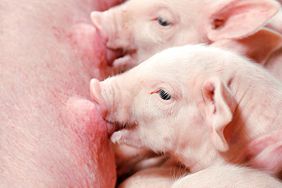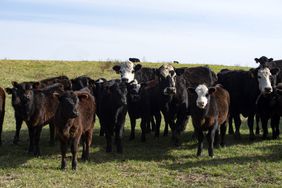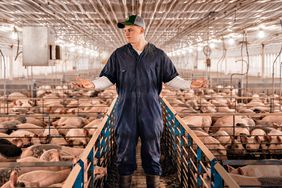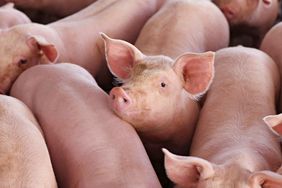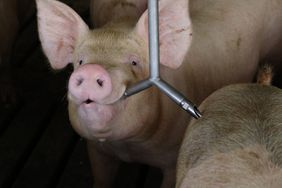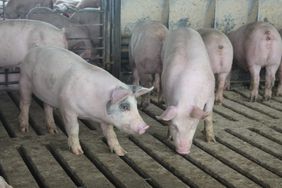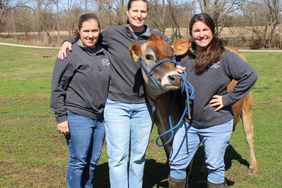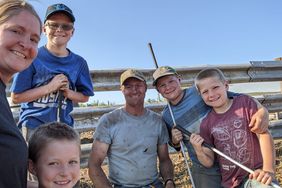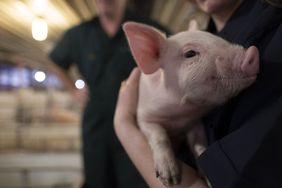:max_bytes(150000):strip_icc()/Andrii20Panchyk-102347161420grayscale5B15D-2000-8a9b6ad07262441b9b61fad1697b6c41.jpg)
While many states in the U.S. have enacted right-to-farm laws that help deter nuisance lawsuits or provide some legal protections to farms, this hasn't stopped plaintiff's groups from filing suit. The settlements and jury verdicts can be extreme.
Chad Blomberg and Jennifer Griffin are litigation attorneys with Lathrop GPM in Kansas City, Missouri. Both have years of experience defending agricultural interests against actions brought by neighbors. They share the current litigation landscape facing pig farmers, the top reasons farmers are being sued, and steps farm owners can take to protect their farm business from litigation and minimize litigation risks.
SF: What can farmers do to lower their risk of being involved in a nuisance suit?
CB: Keep consistent and clear records. One of my cases involved a family farm where one member was responsible for land application duties. The family orally discussed land application, but did not consistently keep a written record of the dates or amounts of application. The jurors, however, expect you to have consistent records. Missing or inconsistent records opens the door to the argument that the reason you don't have records is because you are over-applying or lying about your farm practices, such as land application frequency or amount. Consistent record keeping showing what you are doing at the farm helps make a case more defensible. It helps show that you are an organized and methodical farm, and not a negligent or unreasonable one.
JG: Have established, written policies for procedures that are regularly followed on the farm, whether or not you are required to have an operating permit. If you do have a permit, make sure your policies match the requirements of the permit. Have checklists and records to show that the frequency and amount of manure application.
If you are implementing odor control measures or insect reduction measures, keep records to show the volume of product used and the frequency of use. Even when state law doesn't require you to maintain records, you are better off to have those records because they will protect you. The records demonstrate that you have good policies in place and followed them. The records go a long way in refuting allegations of issues claimed to be caused by the farm.
SF: Is the burden less for a smaller farm?
CB: For swine raised in a CAFO, a confined animal feeding operation, the plaintiff's bar is going to frame your farm, regardless of size, as being a factory farm. They are going to emphasize the thousands of gallons of manure you are producing and land applying and spin that to mean you are a large, corporate farm, even though you may just be a family farm.
In every nuisance case, it is effectively going to be your burden to show that you are a reasonable farmer. It should be the plaintiff's burden to provide that you are an unreasonable farm, but it ends up being the farm's burden in practice.
SF: What are reasonable practices?
CB: The plaintiff's bar is familiar with numerous technologies and ideas that they think you should use as a farm. Some of those ideas are too cutting edge or cost prohibitive, and would only work on large-scale farms. Little things you can do to help yourself is to look up new technology and implement what works at your farm. A farmer should document that he investigated other practices, evaluated them, and assessed whether it would work on his farm.
Stay abreast of technology that can be used to reduce or eliminate order, such as manure additives or even covers on lagoons. Do some research, keep copies of trade journals, so when you are asked at the deposition you can say, 'I have looked into that and am aware of a particular practice or technology. We have assessed that, but it doesn't work for our farm because we would need to be running a much larger operation for that to make sense.'
The goal is for farmers to show they are exploring available options and continually evaluating practices, all of which can help show that they are acting like good neighbors and reasonable farmers.
You are going to have the burden put on you as a farmer to show you are being reasonable. Explore other options, even if it does not work for your farm. A little effort to show you tried to be a better neighbor can help prevent lawsuits and help provide a defense if you are sued.
SF: Odor is hard to define. How do you deal with odor issues?
CB: Some of my clients reach out to their neighbors and say, 'Give me a call any time there is an issue. Tell me when you are having a family gathering such as a BBQ or outdoor wedding. Let me know and I will, for example, agree not to apply manure that day.'
Communication with neighbors can be key to make sure you understand their concerns, and that you are working to address them. If a neighbor in the past has complained about odor, perhaps change your practices on days when that neighbor is downwind, or call them ahead of time to give them a head's up.
Also, neighbors who bring lawsuits frequently keep journals of when they smell odor or notice flies. It goes back to record keeping. The plaintiffs have an economic incentive to be very liberal, misinterpret, or even lie about what they are experiencing on their property. If you have records on your side showing what you were doing on a given day, what time you land applied, for example, or how long it took, you can use that challenge plaintiff's own journals where they took great liberty on what they claimed to smell.
JG: We don't recommend keeping records of odor because those could be used against you if you have a bad day. But reach out to your neighbors, educate them about your practices. Communicate with them and the regulators regularly and keep that dialog going. One of our clients, a long-time hog farmer in Missouri, communicated well with his neighbors so they would know when he was going to apply manure. The neighbors knew there would be a brief period associated with that process when it smelled and wouldn't go outside or plan outside activities for those short time frames.
CB: In some cases, we have drawn a large circle around a farm and tried to interview every property owner in that area. The opinions in any rural community about the odors caused by a hog farm can be as polarized as opinions about abortion. There are people who like the farm and people who hate the farm, and sometimes not in between.
There is also a lot of misinformation. People know the farm has a manure pit, but they have unrealistic concerns about what is in that pit.
We suggest that our clients use information available from state agencies or ag groups to show your neighbors that your practices are safe and effective. Education helps dispel some of the unrealistic anxiety about what's going on over there at the farm. That also helps reduce your chance of being sued.
SF: What is the trigger point for these lawsuits?
CB: Good question. Sometimes it is people moving to the area, the spread of the suburbs into farm ground. Sometimes it is personal animosity. They don't like the owner or an employee, and have let small annoyances fester into anger over time. Sometimes it is annoying little slights like they were cut off by a driver working for the farm, or they don't like the livestock trucks that drive by their house at 6:00 in morning. They don't ever bring it up or say anything; it just festers.
JG: Sometimes it's an attorney trying to collect enough plaintiffs so it's lucrative enough to file a lawsuit.
CB: Great point. Someone comes to your house asking about lawsuits or discussing financial recoveries other neighbors have had against factory farmers. We're aware of advocacy groups that will come into an area as part of a grassroots environmental organization. They get neighbors together and start talking about clean water and clean air. They will say that the pits are going to hold millions of gallons of manure, the farms only have a limited lifespan, and after that everything will be abandoned. The neighbors hearing this get nervous, which can lead to neighbors joining in a mass lawsuit. In our research we've found that some of these plaintiffs are not aware of the litigation, nor do they have goals for a lawsuit. They just think they are part of a community environmental group.
SF: What else should farmers be aware of?
JG: Employ the most modern agricultural techniques you can. Using the most modern equipment and facilities goes a long way in insulating you from litigation. If you have older hog barns nearing the end of their useful life, you are more susceptible to complaints about odor. Periodically talk to environmental engineers and regulators to make sure your practices are as modern and reasonable as they can be for the size of your operation.
If you are looking at starting a new operation or expanding, the location can help insulate you from litigation. Consider how heavily a populated area surrounds the farm. The more populated the area, the more likelihood of complaints and litigation. Consider how the wind at the site could carry any odor produced by the farm. Consult with an environmental engineer before you build any structure or decide where on a given tract of property to locate it.
The other major point is to review your insurance annually. Make sure you have the right coverage.
CB: Evaluate your insurance regularly to make sure you have the protection you need. You may need to get a specialty lines insurance policy which requires a specialty lines broker. A lot of farmers have a farm policy that they simply renew every year without considering whether it meets their needs, or whether their risks have changed. Those policies commonly exclude pollution or environmental contamination. You may need to spend the money to buy a special lines policy for environmental pollution coverage, which, in the grand scheme of things, may be less expensive than you think. Without it, you may find yourself in a lawsuit defending the claims by your neighbors and at the same time in a lawsuit with your insurance company about whether there is coverage for the claim against you by the plaintiffs.

